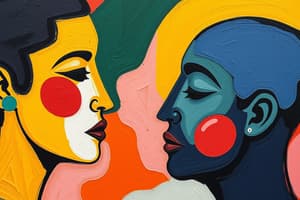Podcast
Questions and Answers
What is the primary concept behind national identity?
What is the primary concept behind national identity?
- Attachment to a specific religious group
- Identification with a nation as a social construct (correct)
- Affiliation with a particular ethnicity
- Beliefs and practices associated with culture
Which of the following best describes values in a sociological context?
Which of the following best describes values in a sociological context?
- Standards used to decide what is desirable and good (correct)
- Expectations linked to social roles
- Positions held within a social hierarchy
- Rules that govern behavior within a group
What type of status is acquired involuntarily?
What type of status is acquired involuntarily?
- Ascribed status (correct)
- Achieved status
- Social status
- Cultural status
Which term describes the conflict arising from roles associated with multiple statuses?
Which term describes the conflict arising from roles associated with multiple statuses?
What is the primary function of norms in society?
What is the primary function of norms in society?
Which of the following is an example of prescriptive norms?
Which of the following is an example of prescriptive norms?
How are achieved statuses primarily defined?
How are achieved statuses primarily defined?
Which aspect of identity refers to one's affiliation with a specific ethnicity?
Which aspect of identity refers to one's affiliation with a specific ethnicity?
What is the main purpose of socialization in an individual's life?
What is the main purpose of socialization in an individual's life?
Which of the following best defines enculturation?
Which of the following best defines enculturation?
What is considered a form of social control?
What is considered a form of social control?
Which stage in the three-stage process of self-development involves faking different roles to understand social structures?
Which stage in the three-stage process of self-development involves faking different roles to understand social structures?
What is meant by 'The Generalized Other' in self-development?
What is meant by 'The Generalized Other' in self-development?
What is one goal of socialization?
What is one goal of socialization?
Which of the following concepts describes the collective attitudes shared among individuals in a society?
Which of the following concepts describes the collective attitudes shared among individuals in a society?
What is a primary characteristic of retreatism as a form of deviance?
What is a primary characteristic of retreatism as a form of deviance?
Study Notes
Becoming a Member of Society
-
Enculturation/Socialization: The process of learning and internalizing the norms, values, and behaviors of a culture.
-
Identity Formation: The development of an individual's sense of self, including their beliefs, values, and sense of belonging.
-
Norms and Values:
- Norms: Rules that guide behavior in a society or group. They can be explicit (written laws) or implicit (unwritten expectations).
- Values: Culturally defined standards that determine what is considered desirable, good, and beautiful. They provide a framework for making judgments and decisions.
-
Statuses and Roles:
- Status: A social position that a person holds.
- Ascribed Status: A status that is assigned at birth or involuntarily, like gender or race.
- Achieved Status: A status that is earned or chosen, like professional title or marital status.
- Role: The set of behaviors expected of someone who holds a particular status.
- Status: A social position that a person holds.
Conformity and Deviance
-
Social Control: Mechanisms used by society to ensure conformity to norms and values. Examples include gossip, social ostracism, and formal punishments.
-
Forms of Deviance: Behaviors that violate social norms.
- Ritualism: Following the rules but rejecting the goals of society.
- Retreatism: Rejecting both the goals and the means of society.
- Rebellion: Rejecting both the goals and the means of society, but actively trying to replace them with new ones.
- Innovation: Accepting the goals of society but rejecting the traditional means of achieving them.
-
Human Dignity, Rights, and the Common Good: These concepts are central to social responsibility and address the balance between individual needs and collective well-being.
Socialization
-
A lifelong process of social interaction that helps individuals learn and internalize the culture of their society.
-
Three Goals of Socialization:
- Impulse Control: Developing the ability to manage and regulate emotions and behaviors.
- Role Preparation: Learning and preparing for various social roles throughout life.
- Shared Meanings and Values: Acquiring a common understanding of cultural symbols, beliefs, and values.
Enculturation
-
The process of being socialized into a specific culture.
-
The Self is a sociological concept that refers to the individual's conscious awareness of their identity and place within the social world.
Feral Children
- Individuals raised without significant human contact or socialization.
Three-Stage Process of Self-Development (George Herbert Mead)
- Imitation: Children observe and copy the behaviors of others.
- Play: Children take on different roles and engage in imaginative play.
- Game: Children learn to coordinate their actions with others and understand the expectations of multiple roles in a social setting.
- "The Generalized Other": Individuals develop an internalized sense of societal expectations and norms.
Self-Concept
- The sum of an individual's ideas and understanding of themselves. It includes:
- Physical: Appearance and bodily characteristics.
- Psychological: Emotions, personality traits, and mental abilities.
- Social: Social roles, relationships, and group affiliations.
Cultural Identity
- A person's sense of belonging to a particular culture or group.
Ethnic Identity
- A sense of belonging to a particular ethnic group, often based on shared ancestry, language, or cultural values.
National Identity
- A feeling of belonging to a particular nation, often based on shared history, values, and symbols.
Religious Identity
- A person's affiliation with a particular religious faith, often based on shared beliefs, practices, and values.
Norms and Values
- Norms: Rules that guide behavior in a society, whether explicitly stated or implied.
- Prescriptive: Rules that tell us what we should do.
- Proscriptive: Rules that tell us what we should not do.
- Values: Culturally defined standards that determine what is considered desirable, good, and beautiful.
- Filipino Values: Key values in Filipino culture, such as family orientation, respect for elders, and hospitality.
Status and Roles
- Status: The position that a person holds in a social system.
- Ascribed Status: A status that is assigned at birth or involuntarily.
- Achieved Status: A status that is earned or chosen.
- Role: The set of behaviors expected of someone who holds a particular status.
- Role Strain: Conflicts that arise when the roles associated with different statuses clash.
Studying That Suits You
Use AI to generate personalized quizzes and flashcards to suit your learning preferences.
Related Documents
Description
This quiz explores key concepts of sociology including enculturation, socialization, identity formation, norms, values, and social roles. Test your understanding of how individuals learn to navigate and integrate into their societies. Dive deep into the building blocks of social structures and personal identity.




